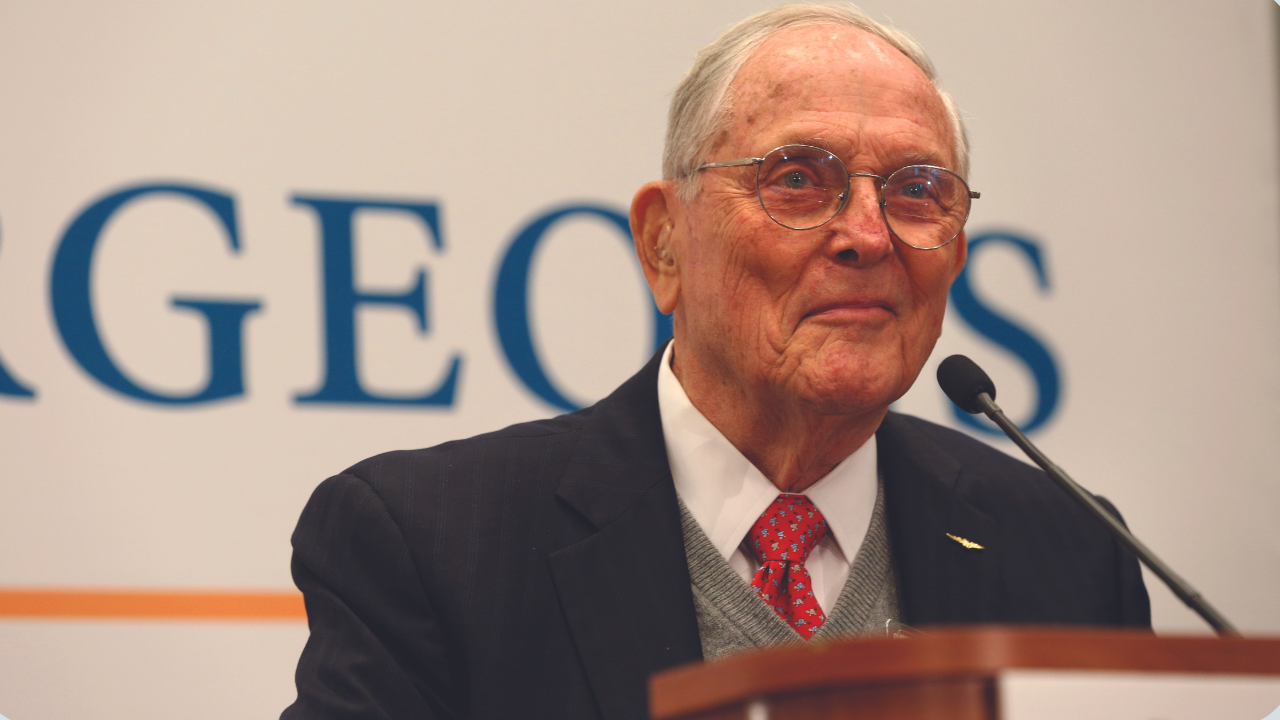W. Hardy Hendren III, MD, FACS, Past-Second Vice-President of the American College of Surgeons (ACS) and recipient of the Jacobson Innovation Award, passed away peacefully at home March 1 in Duxbury, MA. He was 96 years old.
Childhood and Education
Dr. Hendren was born February 7, 1926, in New Orleans, LA, and raised largely in Kansas City, MO. An excellent student, he sang in the church choir and became an Eagle Scout. He first discovered what would be his lifelong passion—surgery—while dissecting a tadpole, and also was influenced by watching a boyhood friend die from a congenital defect that was incurable at the time.
He attended the Woodberry Forest School in Virginia, graduating in 1943. Dr. Hendren enrolled at Dartmouth College, Hanover, NH, but after a semester enlisted as a US Navy aviation cadet during World War II. He was called to active duty in October 1943. He earned his wings and was carrier-qualified, though peace came before he could be sent into combat. Dr. Hendren returned to Dartmouth, but not before marrying the love of his life, Eleanor McKenna, in 1947. He earned his bachelor’s degree from Dartmouth in 1948 and in 1950 completed Dartmouth’s 2-year medical program. He then transferred to Harvard Medical School, where he graduated cum laude in 1952. As a senior at Harvard, it was his inspiration and leadership that created the National Internship Matching plan, now known as the National Resident Matching Program. After serving as an intern and assistant resident at Massachusetts General Hospital (MGH), Dr. Hendren was a senior surgical resident at Children’s Hospital, Boston (now Boston Children’s Hospital), where he trained under the pioneering pediatric surgeon Robert E. Gross, MD, FACS. Dr. Hendren served in 1958 as chief surgical resident at MGH under Edward D. Churchill, MD, FACS, and then as chief surgical resident at Boston Children’s. After 8 years of training, Dr. Hendren returned to MGH at Dr. Churchill’s request, founding the department of pediatric surgery. He served as chief from 1960 to 1982 and began to specialize in the repair of pediatric conditions that previously had been considered intractable. In 1969, he became the first surgeon in Boston to successfully separate conjoined twins.
Pioneering Procedures
Dr. Hendren was renowned for his technical prowess, and during his years at MGH, he developed pioneering approaches to general pediatric surgery and pediatric urology. He perhaps is best known for his groundbreaking success in the correction of complex genitourinary defects such as cloaca, a defect involving multiple abdominal organs and systems that generations of surgeons before him had pronounced impossible to fix. Megaureter repair was another of Dr. Hendren’s contributions that became a staple of reconstructive urology. Many of these complex operations lasted 18 hours or more, earning him the nickname “Hardly Human”—a term used endearingly by friends and fearfully by some house staff. His quest for technical perfection was legendary. He often performed massive reconstruction operations, and if he thought that there was any imperfection after many hours in the operating room, he would restart the procedure. Over 2 decades, Dr. Hendren built the department of pediatric surgery at MGH into an internationally renowned clinical and research center. In 1982, Dr. Hendren was named to the post once held by his mentor Dr. Gross—chief of surgery at Boston Children’s Hospital. During his 16 years as chief, Dr. Hendren continued training surgeons, many of whom went on to become chiefs of surgery and pioneers at other institutions. He operated on thousands of patients and was the first Robert E. Gross Professor of Surgery at Harvard Medical School.
Global Leadership
Dr. Hendren was invited to teach and operate around the world. He operated in more than 60 countries, on his own time and at his own expense, and regarded the experience as a great privilege. These efforts, along with his work in the US, where he also lectured and operated in many cities—and where he gave free care to patients who were without the means to pay—would bring him more than two dozen major honors, including the 2012 ACS Jacobson Innovation Award. The College named him an Icon in Surgery in 2016. In addition to training surgeons around the globe, Dr. Hendren wrote more than 400 scientific papers, monographs, book chapters, and books. He also was a medical photographer and filmmaker; he shot and developed photographs for a number of his articles and made 20 medical documentaries. He was active and served in leadership roles in many of the world’s leading surgical organizations. Before serving as Second Vice-President of the ACS (1997−1998), he served on the Board of Governors (1980−1986), Advisory Councils for Surgical Specialties (1981−1986), Committee on Video-Based Education (1974−1984), and Communications Committee (1997−1998). The founder and twice-elected president of the American Pediatric Surgical Association, he also held leadership positions in the American Surgical Association, American Urological Association, American Academy of Pediatrics, and New England Surgical Society. He was an honorary fellow of the Royal Colleges of Surgeons of England, Ireland, and Glasgow. Dr. Hendren earned the Distinguished Eagle Scout Award, presented to him in December 2011 by fellow Distinguished Eagle Scout Michael Dukakis, former Governor of Massachusetts.
Dr. Hendren received a personal letter of congratulations from another Distinguished Eagle Scout, astronaut Neil Armstrong.
In 2008, Harvard Medical School established the Hendren Chair in Surgery and two faculty development endowed fellowships in his name. A third, the Eleanor and Hardy Hendren Endowed Fellowship, was established at the department of surgery at Boston Children’s Hospital with funding from grateful families. In 2012, Dr. Hendren was named the Distinguished Robert E. Gross Professor of Surgery, Harvard Medical School; Surgeon-in-Chief, Emeritus, Boston Children’s Hospital; and Honorary Surgeon, MGH. Among his greatest joys toward the end of his life was receiving news from patients about their lives, careers, children, and even grandchildren.
A not-for-profit foundation, The Hendren Project, was established in 2014 to honor his contributions to global surgical care. With more than 5,000 regular users from 138 different countries, surgeons work with the resources of The Hendren Project to meet online through a series of virtual events at which peers and experts present and discuss difficult patient cases.
A Friend and Colleague’s Experience
“Dr. Hendren was a great humanitarian. Not only was he a surgical pioneer, but a warm and gracious human being,” said ACS Past-President Kathryn Anderson, MD, FACS. “He was one of the very first to promote the inclusion of women in surgery and treated them as equal to men in ability,” she said. “Not only was he a hero to his patients but, if they had come to him from across the country or the world, he had them stay at his home. His steely blue eyes sometimes would give him the appearance of aloofness, but to those who came to know him, his personal interest in their lives and families and his genuine warmth and kindness endeared him to the many who will greatly miss him,” Dr. Anderson added. Dr. Hendren is survived by his wife of 75 years, Eleanor—to whom he always credited much of his success—and his children and their spouses: Douglas Hardy Hendren, MD, and Nancy Hendren, Harrisonburg, VA; William Grant Hendren, MD, FACS, and Linda Hendren, Duxbury, MA; Robert Bruce Hendren, MD, and Dominique Hendren, Goshen, KY; David Fraser Hendren and Astrid Hendren of Medfield, MA; and 11 grandchildren and five great-grandchildren. His only daughter, Sandra McLeod Hendren, a teacher and nurse, died of complications of diabetes in 1984.



